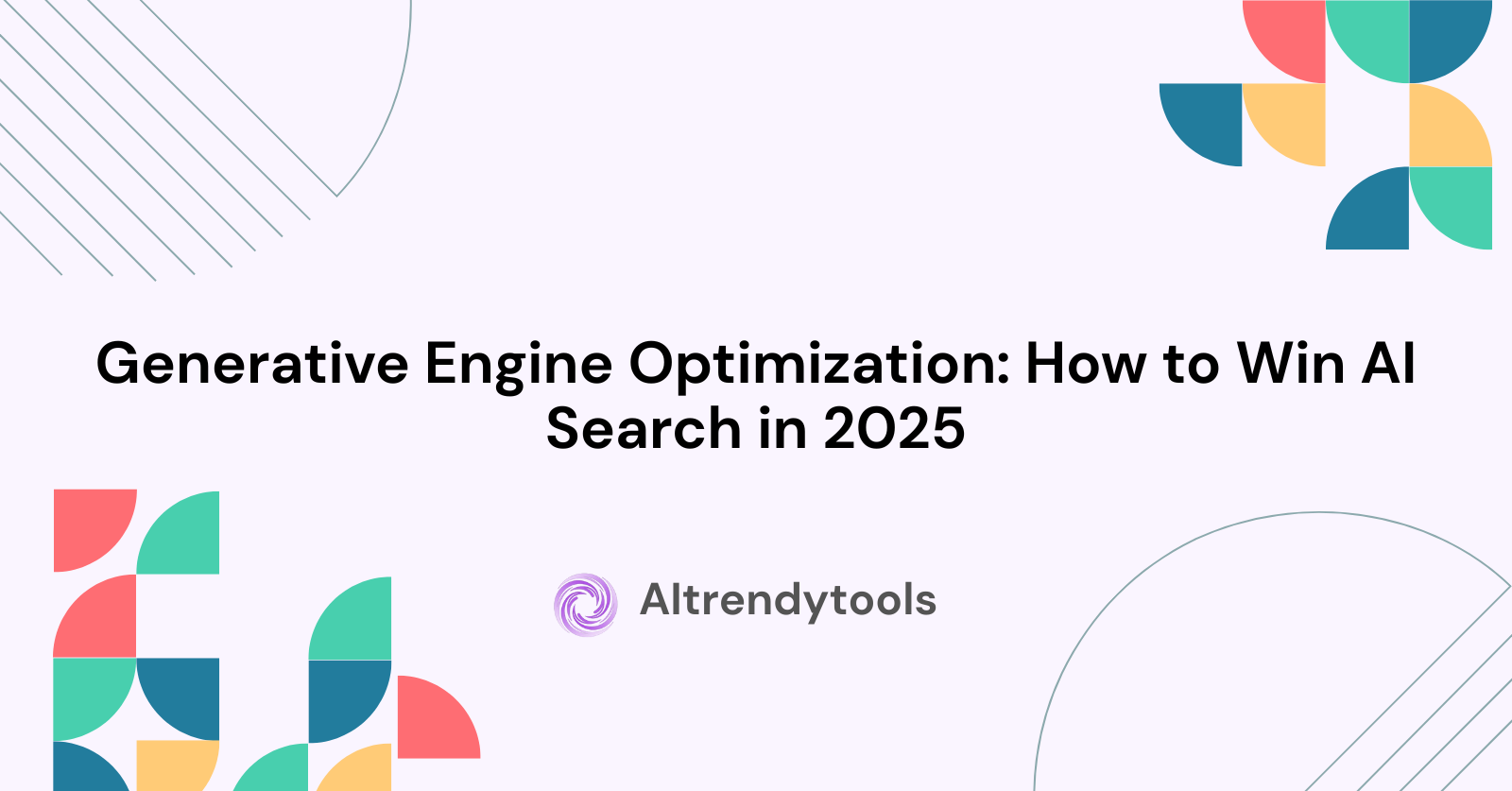🔥 AITrendytools: The Fastest-Growing AI Platform |
Write for us
Search isn’t just changing; it’s fragmenting into entirely new paradigms. The traditional dichotomy between organic and paid results feels quaint compared to the seismic shift happening beneath the surface. In 2025, the most significant transformation involves how information itself gets processed, synthesized, and delivered.
Generative search engines aren’t merely reorganizing existing content or providing better pathways to websites. They’re fundamentally reimagining the relationship between query and answer, creating responses that never existed before by weaving together disparate sources into coherent, contextual narratives.
What we’re witnessing is the emergence of Generative Engine Optimization (GEO). Unlike traditional SEO, which focused on gaming algorithmic preferences through technical manipulation, GEO requires becoming a trusted knowledge source that machines can reliably cite, synthesize, and build upon.
The architecture of AI understanding
Traditional search engines operated on simple principles: crawl, index, rank, and serve. Generative AI engines operate differently; they don’t just index content, they internalize it.
When a large language model encounters your content, it’s attempting to understand semantic relationships, the logical flow of arguments, the credibility of claims, and how your information fits within a broader knowledge ecosystem. This process is far more nuanced than traditional indexing.
A perfectly optimized page for traditional SEO might be completely invisible to a generative engine if the content lacks conceptual clarity or fails to contribute meaningfully to the model’s understanding of a topic.
The transition demands a new mental model for content creators and marketers. Instead of thinking about pages that rank, we need to think about knowledge that teaches. Instead of optimizing for crawlers, we need to optimize for comprehension.
The semantic web finally arrives
For decades, technologists promised a “semantic web” where machines could understand meaning, not just match strings. That future has quietly arrived through the pattern recognition capabilities of large language models.
These models excel at identifying semantic relationships that traditional algorithms missed entirely. They understand that “customer acquisition cost” and “CAC” refer to the same concept. They recognize that a discussion regarding “sustainable packaging materials” relates semantically to “environmental supply chain optimization” even without explicit keyword overlap.
This semantic understanding creates new opportunities for brands willing to think beyond traditional keyword strategies. The companies that will dominate generative search are those that most clearly and consistently articulate their expertise within well-defined conceptual territories.
From content marketing to knowledge engineering
The content marketing playbooks of the past decade emphasized volume, frequency, and engagement metrics. The GEO era demands precision, depth, and optimistic value. It’s no longer sufficient to produce content that attracts human readers; you must create knowledge assets that enhance machine understanding.
This transition requires thinking like a knowledge engineer rather than a content marketer. Knowledge engineers ask different questions:
- How does this information connect to existing knowledge?
- What gaps does it fill?
- How clearly can the core concepts be extracted and applied in different contexts?
Implementing comprehensive GEO strategies requires capabilities that extend far beyond traditional content marketing or SEO teams. It demands semantic analysis, knowledge architecture, and a systematic approach to building machine-readable authority across content ecosystems.
This is where specialized services like Skale’s GEO service offerings become valuable, approaching generative engine optimization as a distinct discipline requiring dedicated expertise in how AI models process and synthesize information, rather than treating it as an attachment of existing SEO practices.
Consider the difference between a traditional blog post titled “10 Tips for Better Email Marketing” and a knowledge-engineered piece on “The Psychology of Email Engagement: Cognitive Principles and Behavioral Triggers.” The former might generate more clicks, but the latter contributes more substantially to an AI model’s understanding of the underlying mechanisms that drive email effectiveness.
The citation economy
In the generative search area, citations function as a new form of currency. But unlike traditional backlinks, these citations operate at the knowledge level rather than the page level. When an AI model synthesizes information from multiple sources to generate a response, it’s essentially creating a complex citation network that determines which sources get referenced, paraphrased, or ignored entirely.
Understanding this citation economy requires recognizing that credibility compounds differently in AI systems. Traditional authority metrics like domain rating or page authority matter less than conceptual authority, becoming the definitive source for specific ideas, frameworks, or datasets that AI models consistently rely upon.
This creates fascinating strategic opportunities:
- Niche dominance becomes disproportionately valuable: A relatively small company with deep expertise in a specific area can achieve outsized visibility by becoming the canonical source for key concepts within that domain.
- The barrier to entry shifts from budget to expertise: Success doesn’t require massive marketing spend or technical SEO resources; it demands genuine knowledge articulated with exceptional clarity.
- Compound effects amplify over time: Each citation reinforces your authority, creating a virtuous cycle where AI models increasingly turn to your content as a trusted reference point.
The precision imperative
Generative AI models are remarkably good at detecting ambiguity, inconsistency, and logical gaps in content. They can identify when claims are poorly supported, when definitions are circular, or when arguments contain unstated assumptions. This creates a natural filter that elevates precise, well-reasoned content.
The precision imperative extends beyond individual pieces to entire content ecosystems. AI models evaluate consistency across different pieces from the same source. If your website defines a concept one way in a blog post and differently in a white paper, the model may view your source as less reliable overall.
This consistency requirement creates both challenges and opportunities. Organizations must audit their entire content library for conceptual coherence, but those that achieve coherence gain significant advantages in AI-driven search results.
Structured knowledge as a competitive advantage
The most successful GEO strategies treat content creation as knowledge graph construction. Every piece of content becomes a node in a larger network of concepts, relationships, and supporting evidence. This network approach allows AI models to understand not just individual facts but the logical connections between ideas.
Implementing this approach requires sophisticated content planning that maps out conceptual territories before creating individual assets. It means developing content taxonomies that reflect how AI models categorize information, not just how human users navigate websites.
The organizations mastering this approach are creating “machine-readable expertise”—content ecosystems so well-structured and internally consistent that AI models naturally turn to them as authoritative sources.
The attribution challenge
One of the most complex aspects of GEO involves the attribution problem. When an AI model generates a response by synthesizing information from multiple sources, determining proper attribution becomes technically and ethically complex.
Clear traffic attribution was an important part of traditional SEO. You could see which pages brought in which visitors. Because generative search makes attribution less clear, your content could affect thousands of AI-generated responses without you being able to see that impact directly.
The attribution ambiguity requires new measurement strategies that go beyond traditional analytics:
- Monitor brand mentions in AI responses: Track how often your company, products, or key concepts appear in generative search results across different platforms and query types.
- Measure conceptual associations: Analyze whether AI models correctly associate your brand with your target expertise areas and competitive positioning.
- Track qualitative thought leadership indicators: Monitor speaking opportunities, media requests, and industry recognition that stem from AI-driven content discovery.
- Develop semantic listening capabilities: Use specialized tools to understand how your key messages and frameworks are being interpreted and repeated by AI systems.
Some forward-thinking organizations are developing sophisticated monitoring systems that provide crucial feedback for refining content strategies and identifying emerging opportunities in the AI-driven information setting.
The most effective GEO implementations combine technical precision with strategic approaches to knowledge positioning. They require understanding both the mechanics of how AI models process information and the broader competitive context of expertise within specific domains.
Future-proofing through fundamental value
The most encouraging aspect of the GEO era involves rewarding real and natural expertise with clear communication over manipulative tactics. In contrast to classic SEO, which often relies on exploiting algorithmic choices through technical tricks, achieving success in GEO necessitates a deep understanding of your subject matter and the ability to communicate it with exceptional clarity, equal to the offerings provided by Skale mentioned earlier.
This alignment between optimization tactics and fundamental value creation suggests that GEO strategies will be more durable than their predecessors. Companies that invest in building honest expertise and conveying it effectively are positioning themselves for long-term success in an AI-driven information habitat.
The strategic imperative
Organizations serious about competing in the generative search atmosphere must entirely reconceptualize their relationship with content and knowledge.
The goal centers on developing entirely new capabilities around knowledge engineering and semantic consistency. And machine-readable expertise.
The opportunity for early adoption advantages remains available but is closing quickly as more organizations acknowledge the strategic significance of GEO. Companies that establish strong positions in AI frameworks today will benefit from compounding advantages as they become more sophisticated and influential.
Author:
Mika Kankaras
Mika is a fabulous SaaS writer with a talent for creating interesting material and breaking down difficult ideas into readily digestible chunks. As an avid cat lover and cinephile, her vibrant personality and diverse interests bring a unique spark to her work. Whether she's diving into the latest tech trends or crafting compelling narratives for B2B audiences, Mika knows how to keep readers engaged from start to finish. When she’s not writing, you’ll likely find her rewatching classic films or trying to teach her cat new tricks (with mixed results).
🚀 Submit Your Tool to Our Comprehensive AI Tools Directory
Get your AI tool featured on our complete directory at AITrendytools and reach thousands of potential users. Select the plan that best fits your needs.





Join 30,000+ Co-Founders
Publisher
aitrendytools
Publisher
aitrendytools
Category
blogPlan
FreeRelated Tools
Lovable AI
Complete Lovable AI guide 2025. Build production-ready apps without coding using AI. Features, pricing, tutorial & alternatives covered.
Chamet
Complete Chamet app guide covering download, live video chat features, safety tips & user reviews. Connect globally with secure video calling.
Aitrendytools
Learn how to edit cooking videos like a pro using CapCut Desktop. This step-by-step guide covers filters, transitions, AI voiceovers, and text overlays to help food creators make visually stunning, high-engagement content for YouTube, Instagram, and TikTok.
Submit Your Tool to Our Comprehensive AI Tools Directory
List your AI tool on AItrendytools and reach a growing audience of AI users and founders. Boost visibility and showcase your innovation in a curated directory of 30,000+ AI apps.





Join 30,000+ Co-Founders

